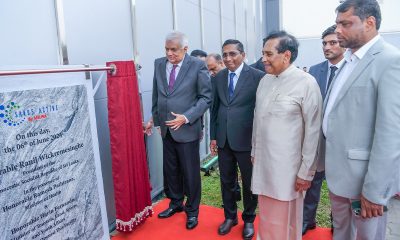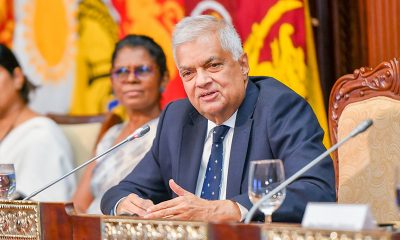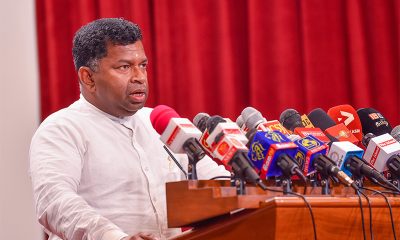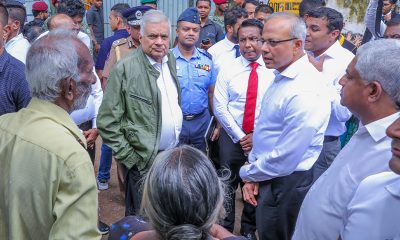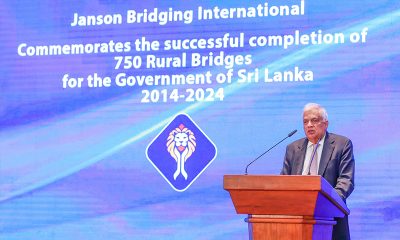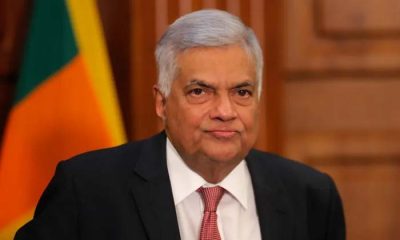News
RW’s Japan visit signals Sri Lanka’s tilt towards Asia for enhanced cooperation and economic recovery
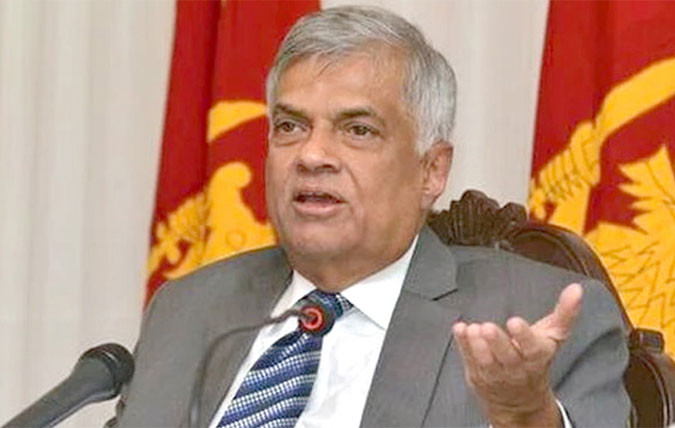
By Rose Kenny
During his recent visit to Japan, President Ranil Wickremesinghe highlighted the country’s resolute tilt towards Asia, signalling a strategic shift in its foreign policy. Building on the government’s vision to elevate Asia as a global centre of economic integration, President Wickremesinghe’s address at the Nikkei Forum, Future of Asia, outlined his vision for the region.
This inclination towards Asia is not a new development, as the President had previously reached out to Japan upon assuming office, following the footsteps of former President J.R. Jayewardene, who placed significant emphasis on fostering strong ties with Japan. With this visit, President Wickremesinghe has firmly established Sri Lanka’s intention to actively shape Asia’s future rather than remaining on the side-lines and allowing global powers to determine the region’s destiny.
This pronounced tilt towards Asia has been viewed as a significant evolution in Sri Lanka’s foreign policy, positioning the country as an active participant in the decision-making processes of the region.
During his address in Tokyo, President Wickremesinghe reiterated that Asia should not be dragged into the power rivalry between China and the United States. He emphasized that the role of the Asian region in global politics should be decided through multilateral dialogue among its member states.
Japanese Prime Minister Fumio Kishida, speaking after President Wickremesinghe at the Nikkei Forum, expressed a similar sentiment. Prime Minister Kishida highlighted Japan’s pursuit of a “Free and Open Indo-Pacific” (FOIP) policy, which ensures each country’s sovereignty and decision-making regardless of its size.
The President’s message resonated with other Asian leaders present at the forum, including former Malaysian Prime Minister Dr. Mahathir Mohammed, President of Laos, and Deputy Prime Ministers of Singapore, Vietnam, and Thailand. They all shared the belief that Asia should have a seat at the table of global powerhouses.
One key aspect highlighted by both President Wickremesinghe and Prime Minister Kishida was the need for multilateral cooperation among Asian states. While acknowledging the advanced positions of China, India, and Japan, both leaders emphasized the importance of involving the rest of Asia, including ASEAN and Indian Ocean states, in shaping the region’s future. This aligns with Japan’s “New Plan for a Free and Open Indo-Pacific” (FOIP), which emphasizes multi-layered connectivity across Asia.
President Wickremesinghe’s foreign policy direction has been welcomed by regional and domestic interest groups in Sri Lanka. The country has been a passive observer as Asia progressed on the global stage, and the President’s vision to reclaim Sri Lanka’s role in regional and global politics is seen as a positive step forward. Coming out of a year of economic crisis and political instability, Sri Lanka is eager to re-establish its presence on the international stage.
During his visit, President Wickremesinghe held crucial meetings with Japan’s Prime Minister Kishida, Japanese Foreign Minister Yoshimasa Hayashi, and Minister of Digital Transformation Taro Kono. The discussions covered a wide range of topics, including debt restructuring talks, cooperation in various fields beyond economics, climate change targets, nuclear disarmament, and digitization efforts in Sri Lanka.
In the meeting with Prime Minister Kishida, President Wickremesinghe expressed gratitude for Japan’s support during Sri Lanka’s economic crisis and debt restructuring talks. He assured Japan that China’s involvement in the talks was limited to bilateral discussions and that Sri Lanka also engaged with the International Monetary Fund (IMF). The President requested China’s full membership in the creditor talks and outlined plans to resume Japanese projects, subject to further discussions.
Prime Minister Kishida expressed Japan’s commitment to supporting Sri Lanka’s economic recovery and expressed willingness to explore avenues for enhanced cooperation. The leaders discussed potential areas of collaboration, including infrastructure development, technology transfer, investment promotion, and capacity building.
In the meeting with Foreign Minister Hayashi, President Wickremesinghe emphasized the importance of strengthening bilateral relations between Sri Lanka and Japan. They discussed the need for increased people-to-people exchanges, cultural cooperation, and educational opportunities. President Wickremesinghe expressed his desire to expand Japanese investments in Sri Lanka and attract Japanese tourists to boost the country’s tourism sector.
The meeting with Minister of Digital Transformation Taro Kono focused on leveraging technology to drive economic growth and digital transformation in Sri Lanka. President Wickremesinghe highlighted the government’s initiatives to promote innovation and entrepreneurship and sought Japan’s expertise in areas such as e-governance, digital infrastructure, and smart cities.In addition to the official meetings, President Wickremesinghe interacted with representatives from the Japan-Sri Lanka Parliamentary Friendship League and the Japan External Trade Organization (JETRO).
These interactions aimed to enhance parliamentary ties, explore trade and investment opportunities, and strengthen cooperation in various sectors, including trade, tourism, agriculture, and fisheries.
The visit also witnessed the signing of several agreements and memoranda of understanding (MoUs) between the two countries. These included agreements on economic cooperation, tourism promotion, cultural exchanges, and academic collaboration. The agreements aimed to facilitate greater cooperation and create conducive environment for bilateral trade and investment.
Overall, President Ranil Wickremesinghe’s visit to Japan marked a significant milestone in strengthening the bilateral relations between Sri Lanka and Japan. The discussions and agreements reached during the visit set the stage for increased collaboration in various fields and demonstrated Sri Lanka’s commitment to actively shaping the future of Asia. The visit provided an opportunity for Sri Lanka to leverage Japan’s expertise, technology, and investments to drive its economic recovery and achieve sustainable development goals.
News
US sports envoys to Lanka to champion youth development

The U.S. Embassy in Colombo welcomed the U.S. Sports Envoys to Sri Lanka, former National Basketball Association (NBA) and Women’s National Basketball Association (WNBA) players Stephen Howard and Astou Ndiaye, from June 8 through 14.
The Public Diplomacy section of the U.S. Embassy said that it would launch a weeklong basketball program intended to harness the unifying power of sports, made possible through collaboration with Foundation of Goodness and IImpact Hoop Lab.
While in Sri Lanka, Howard and Ndiaye, both retired professional basketball players, will conduct a weeklong program, Hoops for Hope: Bridging Borders through Basketball. The Sports Envoys will lead basketball clinics and exhibition matches and engage in leadership sessions in Colombo and Southern Province for youth aged 14-18 from Northern, Uva, Eastern and Western Provinces, offering skills and leadership training both on and off the court. The U.S. Envoys will also share their expertise with the Sri Lanka Basketball Federation, national coaches, and players, furthering the development of basketball in the country. Beyond the clinics, they will collaborate with Sri Lankan schoolchildren to take part in a community service project in the Colombo area.
“We are so proud to welcome Stephen and Astou as our Sports Envoys to Sri Lanka, to build on the strong people-to-people connections between the United States and Sri Lanka,” said U.S. Ambassador Julie Chung. “The lessons that will be shared by our Sports Envoys – communication, teamwork, resilience, inclusion, and conflict resolution – are essential for leadership development, community building, equality, and peace. The U.S. Sports Envoy program is a testament to our belief that sports can be a powerful tool in promoting peace and unity.”
News
Rahuman questions sudden cancellation of leave of CEB employees

SJB Colombo District MP Mujibur Rahuman in parliament demanded to know from the government the reasons for CEB suspending the leave of all its employees until further notice from Thursday.
MP Rahuman said that the CEB has got an acting General Manager anew and the latter yesterday morning issued a circular suspending leave of all CEB employees with immediate effect until further notice.
“We demand that Minister Kanchana Wijesekera should explain this to the House. This circular was issued while this debate on the new Electricity Amendment Bill was pending. There are many who oppose this Bill. The Minister must tell parliament the reason for the urge to cancel the leave of CEB employees,” the MP said.However, Speaker Mahinda Yapa Abeywardena prevented Minister Wijesekera responding to the query and said that the matter raised by MP Rahuman was not relevant.
News
CIPM successfully concludes 8th Annual Symposium

The Chartered Institute of Personnel Management (CIPM) successfully concluded the 8th Annual CIPM Symposium, which took place on 31st May 2024. Themed “Nurturing the Human Element—Redefining HRM in a Rapidly Changing World,” the symposium underscored the pivotal role of human resource management (HRM) in today’s dynamic global landscape. Since its inception in 1959, CIPM has been dedicated to advancing the HR profession through education, professional development, and advocacy, solidifying its position as Sri Lanka’s leading professional body for HRM.
Ken Vijayakumar, the President of the CIPM, graced the occasion as the chief guest. The symposium commenced with the welcome address by the Chairperson, Prof. Arosha Adikaram, followed by the Web Launch of the Symposium Proceedings and Abstract Book by the CIPM President. The event featured distinguished addresses, including a speech by Chief Guest Ken Vijayakumar, President of CIPM, and an address by Guest of Honor Shakthi Ranatunga, Chief Operating Officer of MAS Holdings Pvt. Ltd., Sri Lanka.
The symposium also featured an inspiring keynote address by Prof. Mario Fernando, Professor of Management and Director of the Centre for Cross Cultural Management (CCCM) at the University of Wollongong, Australia.
Vote of Thanks of the inauguration session was delivered by Dr. Dillanjani Weeratunga, Symposium Co-chair.
The symposium served as a comprehensive platform for researchers to present their findings across a wide range of critical topics in HRM. These included Cultural Diversity and Inclusion, Talent Development and Retention, Ethical Leadership and Corporate Social Responsibility, Adapting to Technological Advancements, Mental Health and Well-being at Work, Global Workforce Challenges, Employee Empowerment, and Reskilling and Upskilling.
The plenary session was led by Prof. Wasantha Rajapakse. Certificates were awarded to the best paper presenters during the valedictory session, followed by a vote of thanks delivered by Kamani Perera, Manager of Research and Development.
The annual symposium of CIPM was a truly inclusive event, attracting a diverse audience that spanned undergraduates, graduates, working professionals, research scholars and lecturers. This widespread interest highlights the symposium’s significance in the field of HRM, offering a unique opportunity for everyone to network and learn from scholarly brains.The CIPM International Research Symposium was sponsored by Hambantota International Port, Sri Lanka Institute of Information Technology (SLIIT), E B Creasy & Co. PLC, and Print Xcel Company.


